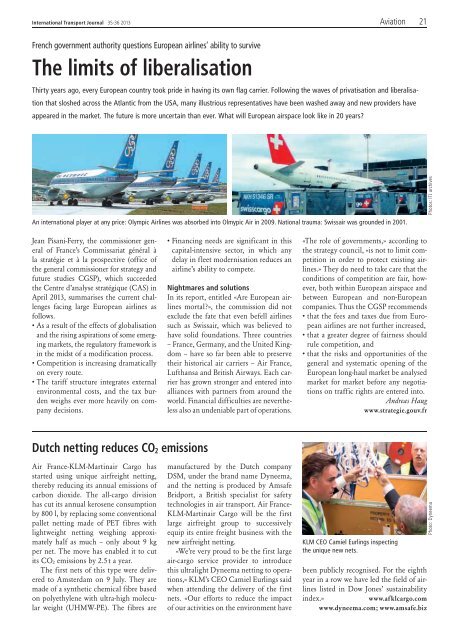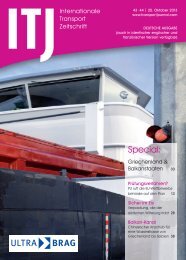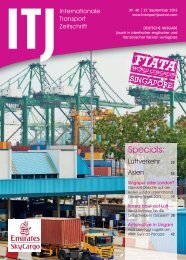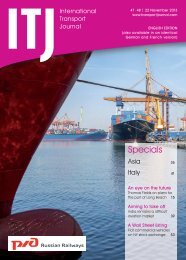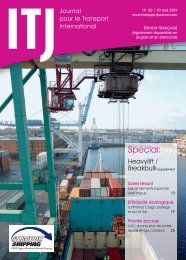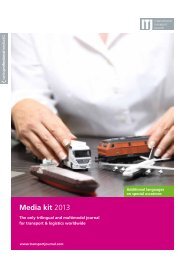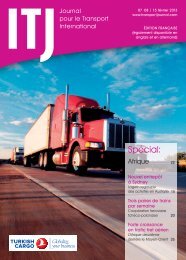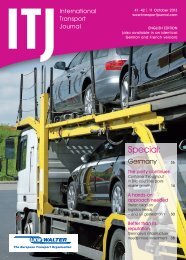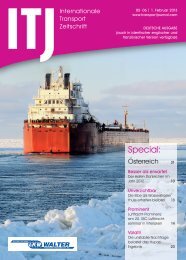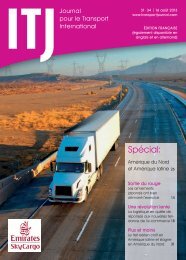Specials - ITJ | Transport Journal
Specials - ITJ | Transport Journal
Specials - ITJ | Transport Journal
- No tags were found...
Create successful ePaper yourself
Turn your PDF publications into a flip-book with our unique Google optimized e-Paper software.
International <strong>Transport</strong> <strong>Journal</strong> 35-36 2013 Aviation21French government authority questions European airlines’ ability to surviveThe limits of liberalisationThirty years ago, every European country took pride in having its own flag carrier. Following the waves of privatisation and liberalisationthat sloshed across the Atlantic from the USA, many illustrious representatives have been washed away and new providers haveappeared in the market. The future is more uncertain than ever. What will European airspace look like in 20 years?An international player at any price: Olympic Airlines was absorbed into Olmypic Air in 2009. National trauma: Swissair was grounded in 2001.Photos: <strong>ITJ</strong> archivesJean Pisani-Ferry, the commissioner generalof France’s Commissariat général àla stratégie et à la prospective (office ofthe general commissioner for strategy andfuture studies CGSP), which succeededthe Centre d’analyse stratégique (CAS) inApril 2013, summarises the current challengesfacing large European airlines asfollows.• As a result of the effects of globalisationand the rising aspirations of some emergingmarkets, the regulatory framework isin the midst of a modification process.• Competition is increasing dramaticallyon every route.• The tariff structure integrates externalenvironmental costs, and the tax burdenweighs ever more heavily on companydecisions.• Financing needs are significant in thiscapital-intensive sector, in which anydelay in fleet modernisation reduces anairline’s ability to compete.Nightmares and solutionsIn its report, entitled «Are European airlinesmortal?», the commission did notexclude the fate that even befell airlinessuch as Swissair, which was believed tohave solid foundations. Three countries– France, Germany, and the United Kingdom– have so far been able to preservetheir historical air carriers – Air France,Lufthansa and British Airways. Each carrierhas grown stronger and entered intoalliances with partners from around theworld. Financial difficulties are neverthelessalso an undeniable part of operations.«The role of governments,» according tothe strategy council, «is not to limit competitionin order to protect existing airlines.»They do need to take care that theconditions of competition are fair, however,both within European airspace andbetween European and non-Europeancompanies. Thus the CGSP recommends• that the fees and taxes due from Europeanairlines are not further increased,• that a greater degree of fairness shouldrule competition, and• that the risks and opportunities of thegeneral and systematic opening of theEuropean long-haul market be analysedmarket for market before any negotiationson traffic rights are entered into.Andreas Haugwww.strategie.gouv.frDutch netting reduces CO 2 emissionsAir France-KLM-Martinair Cargo hasstarted using unique airfreight netting,thereby reducing its annual emissions ofcarbon dioxide. The all-cargo divisionhas cut its annual kerosene consumptionby 800 l, by replacing some conventionalpallet netting made of PET fibres withlightweight netting weighing approximatelyhalf as much – only about 9 kgper net. The move has enabled it to cutits CO 2 emissions by 2.5 t a year.The first nets of this type were deliveredto Amsterdam on 9 July. They aremade of a synthetic chemical fibre basedon polyethylene with ultra-high molecularweight (UHMW-PE). The fibres aremanufactured by the Dutch companyDSM, under the brand name Dyneema,and the netting is produced by AmsafeBridport, a British specialist for safetytechnologies in air transport. Air France-KLM-Martinair Cargo will be the firstlarge airfreight group to successivelyequip its entire freight business with thenew airfreight netting.«We’re very proud to be the first largeair-cargo service provider to introducethis ultralight Dyneema netting to operations,»KLM’s CEO Camiel Eurlings saidwhen attending the delivery of the firstnets. «Our efforts to reduce the impactof our activities on the environment haveKLM CEO Camiel Eurlings inspectingthe unique new nets.been publicly recognised. For the eighthyear in a row we have led the field of airlineslisted in Dow Jones’ sustainabilityindex.»www.afklcargo.comwww.dyneema.com; www.amsafe.bizPhoto: Dyneema


